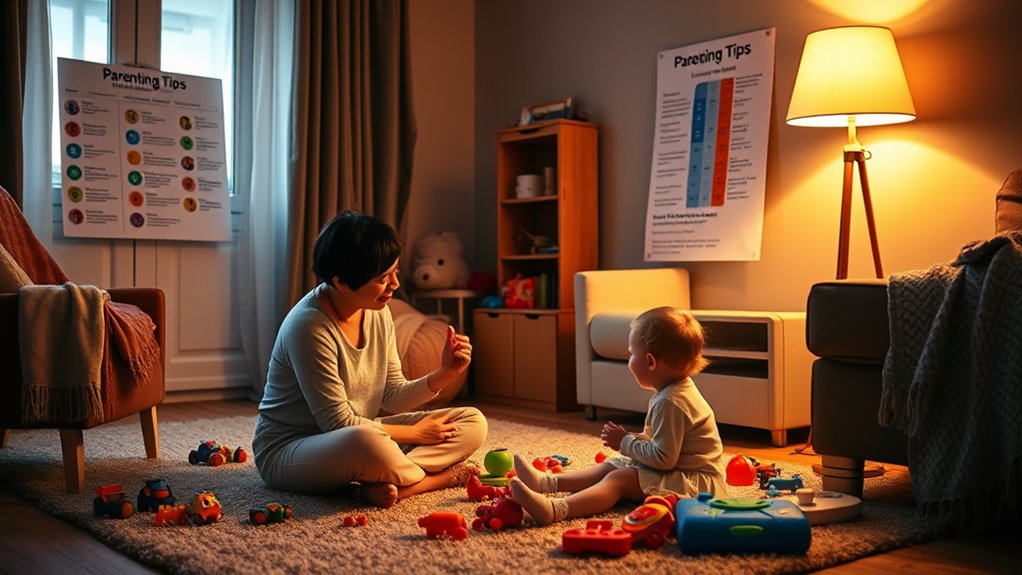The Ultimate Guide to Creating a Calm Bedtime Routine
To create a calm bedtime routine, start by setting a consistent bedtime to regulate your body’s clock. Dim the lights and eliminate distractions to create a peaceful environment. Consider engaging in soothing activities like gentle stretches or mindful meditation to unwind. Limit screen time and incorporate relaxation techniques such as deep breathing or warm baths. Don’t forget to reflect on things you’re grateful for, as it fosters a positive mindset. By following these steps, you’ll pave the way for better sleep. Discover even more tips and strategies to enhance your bedtime experience and improve your overall well-being.
Key Takeaways
- Establish a consistent bedtime to regulate your internal clock and signal your body to wind down.
- Create a calming environment by dimming lights, using soothing scents, and eliminating distractions.
- Engage in relaxing activities like reading, gentle stretches, or meditation to prepare your mind for sleep.
- Limit screen time at least an hour before bed to reduce distractions and promote relaxation.
- Incorporate mindfulness techniques to manage stress and reflect on gratitude to foster a positive mindset.
Understanding Sleep Importance
Sleep is like a vital battery that recharges your mind and body, ensuring you function at your best. When you prioritize sleep, you unlock a range of sleep benefits that enhance your overall well-being.
Quality sleep improves your mood, sharpens your focus, and boosts your immune system, helping you tackle daily challenges with ease. It’s not just about quantity; the quality of your sleep matters too.
On the flip side, sleep deprivation can wreak havoc on your life. It can lead to irritability, decreased cognitive function, and even physical health issues.
You might find it harder to concentrate at work or enjoy your time with family and friends. Over time, chronic sleep deprivation can contribute to serious problems, including anxiety and depression.
Key Elements of a Routine
Establishing a calming bedtime routine is essential for signaling your body that it’s time to wind down. Key elements of this routine can greatly enhance your sleep quality.
Start by setting a consistent bedtime to regulate your body’s internal clock. This helps create a predictable pattern that encourages relaxation.
Incorporating mindful meditation into your routine can be transformative. Spend a few minutes focusing on your breath or using guided meditation apps. This practice not only calms your mind but also prepares you for restful sleep.
Next, consider the ambiance of your space. Soothing scents can play a significant role in creating a tranquil environment. Use essential oils like lavender or chamomile in a diffuser or light a scented candle to fill your room with calming aromas.
These scents can signal your brain that it’s time to relax.
Finally, limit screen time at least an hour before bed. Instead, opt for reading or listening to soft music to further ease your mind.
Step-by-Step Routine Guide
Creating a calming bedtime routine can be as simple as following a step-by-step guide. Start by setting a consistent time for bed each night to regulate your body’s internal clock. This regularity helps signal to your mind that it’s time to wind down.
Next, create a peaceful environment. Dim the lights and eliminate distractions like electronics. Spend a few minutes engaging in nightly rituals that promote relaxation, such as reading a book or practicing gentle stretches. These activities can help ease your mind and body into a more tranquil state.
Incorporate relaxation techniques like deep breathing or meditation. Spend five to ten minutes focusing on your breath, allowing any stress from the day to melt away. You might also consider taking a warm bath to soothe your muscles and prepare for sleep.
Finally, end your routine with gratitude. Reflect on three things you’re thankful for, helping to shift your mindset toward positivity.
Tips for Overcoming Challenges
Overcoming challenges in your bedtime routine can feel daunting, but with a few simple strategies, you can make it easier.
Start by identifying the specific obstacles you face. Whether it’s stress management or technology limitations, knowing what you’re up against is half the battle.
Here are three tips to help you navigate these challenges:
-
Set Boundaries: Establish a technology cut-off time. Turning off screens an hour before bed can reduce distractions and promote relaxation.
-
Create a Wind-Down Ritual****: Incorporate calming activities like reading, journaling, or light stretching. This helps signal to your mind that it’s time to unwind.
-
Practice Mindfulness*: Use deep breathing or meditation techniques to *manage stress. Even a few minutes can help clear your mind and prepare it for sleep.
Implementing these strategies can make a significant difference in your bedtime routine.
Enhancing Your Sleep Environment
Transforming your sleep environment can greatly impact the quality of your rest. Start by prioritizing sleep hygiene; keep your bedroom clean and clutter-free. Dust and allergens can disrupt your sleep, so regular cleaning is essential.
Next, consider your bedding. Invest in comfortable pillows and a supportive mattress that cater to your sleeping style. The right sheets can also make a difference—opt for breathable materials like cotton or linen that help regulate temperature.
Ambient lighting plays a crucial role in setting the mood for sleep. Dim the lights an hour before bedtime to signal your body that it’s time to wind down. Use soft, warm bulbs in lamps, and consider blackout curtains to block out unwanted light from outside.
If you need a nightlight, choose one with a low intensity to avoid disrupting your melatonin production.
Lastly, pay attention to noise levels. Use earplugs or a white noise machine if outside sounds are a problem. By creating a peaceful and comfortable sleep environment, you’ll set the stage for a restorative night’s sleep, making it easier to relax and drift off.
Frequently Asked Questions
What Time Should I Start My Bedtime Routine?
You should start your bedtime routine about 30 to 60 minutes before sleep. This allows time for calming bedtime rituals and an evening wind down, helping you relax and prepare for a restful night.
Can I Use My Phone Before Bed?
You can use your phone before bed, but it’s best to limit it. Blue light can disrupt your sleep quality, making it harder to fall asleep. Try switching to a blue light filter or reducing usage.
How Long Should My Routine Last?
Studies show that a consistent routine duration of 30 to 60 minutes can significantly improve sleep quality. Incorporate optimal activities like reading or meditation to help you unwind and prepare for a restful night’s sleep.
Is It Okay to Skip My Routine Occasionally?
It’s perfectly okay to skip your routine occasionally. Life happens, and routine flexibility is important. Just remember that occasional breaks can help you recharge, so don’t stress too much if you miss a night.
What if I Have Trouble Falling Asleep?
Did you know that about 30% of adults experience sleep anxiety? If you’re struggling to fall asleep, try relaxation techniques like deep breathing or meditation to calm your mind and ease that anxiety for better rest.





